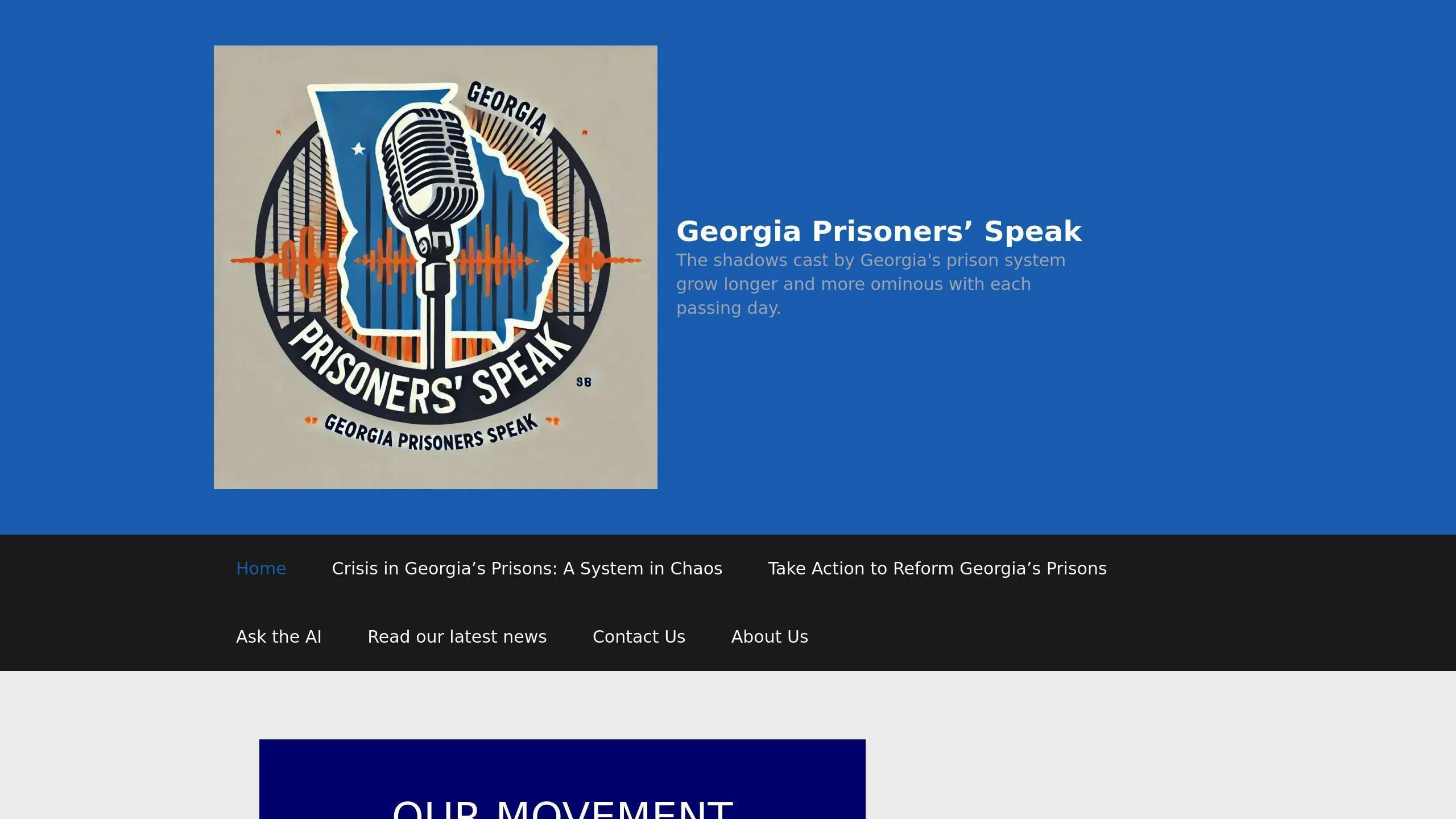Reporting prison abuse in Georgia is essential to addressing misconduct and protecting human rights. Here’s how you can safely take action:
- Use the PREA Hotline: Call 1-888-992-7849 to report sexual abuse or harassment confidentially.
- File a Complaint with the Ombudsman: Report other misconduct anonymously to the Georgia Department of Corrections (GDC) Ombudsman.
- Seek Help from Advocacy Groups: Organizations like Georgia Prisoners’ Speak (GPS) provide support, legal aid, and guidance for whistleblowers.
- Document Everything: Include details like dates, locations, names, and evidence to strengthen your report.
Quick Tips for Safe Reporting:
- Ensure Confidentiality: Use anonymous channels when needed.
- Leverage Legal Protections: The Georgia Whistleblower Protection Act shields whistleblowers from retaliation.
- Collaborate with Advocacy Groups: Groups like GPS amplify your voice and push for systemic reform.
By reporting abuse, you contribute to exposing systemic issues and driving meaningful change in Georgia’s prison system.
How to File a Whistleblower Retaliation Complaint
How to Report Prison Abuse Safely
Reporting abuse in Georgia’s prison system requires careful planning to ensure both your safety and the effectiveness of your report. The Georgia Department of Corrections (GDC) provides official channels designed to handle misconduct reports while protecting the identities of those who come forward.
Reporting Abuse Through the PREA Hotline
The PREA hotline (1-888-992-7849) is a confidential, toll-free service for reporting sexual abuse or harassment in Georgia’s prisons. Calls are reviewed by the PREA Unit staff during business hours (Monday through Friday, 8 a.m. to 5 p.m.), and all reports are kept strictly confidential [1].
Filing a Complaint with the Georgia Department of Corrections Ombudsman
For misconduct beyond sexual abuse, the Ombudsman’s office is the appropriate channel. You can make anonymous complaints, ensuring protection from retaliation while still addressing your concerns.
When submitting a complaint, include the following details:
| Required Information | Details |
|---|---|
| Incident Details | Date, time, and location of the incident |
| Involved Parties | Names of staff, inmates, or witnesses |
| Evidence | Any documentation or witness statements |
| Timeline | A chronological account of events |
While anonymous submissions are accepted, providing contact information can help investigators follow up on your report [1][3].
Seeking Help from Advocacy and Legal Groups
Organizations such as Georgia Prisoners’ Speak (GPS) offer essential support for those reporting abuse. GPS has successfully organized collective actions to address systemic issues, including improving prison conditions [2].
When working with advocacy groups:
- Thoroughly document incidents and follow any confidentiality protocols they provide.
- Consider seeking legal advice through groups like GPS, which can connect you with attorneys experienced in handling prison abuse cases.
For additional assistance, explore other advocacy and legal organizations focused on prison reform and the rights of incarcerated individuals.
Resources to Help Whistleblowers
Reporting prison abuse in Georgia comes with challenges, but several organizations and tools are available to provide support and protection. These resources aim to reduce risks for whistleblowers and ensure their efforts lead to meaningful change.
Support from Georgia Prisoners’ Speak (GPS)

Georgia Prisoners’ Speak (GPS) plays a key role in highlighting prison conditions and assisting whistleblowers. For example, in 2020, GPS organized a grievance campaign that resulted in over 120 complaints about inadequate food during the pandemic, showing how collective action can amplify whistleblowers’ voices [2].
Here’s how GPS supports whistleblowers:
| Service Type | Description |
|---|---|
| Evidence Support | Assistance with documenting and organizing reports through a secure portal |
| Advocacy | Coordinating group efforts and sharing reports with media for broader reach |
| Family Resources | Guidance and help for families of whistleblowers and incarcerated individuals |
Legal Assistance for Whistleblowers
Under the Georgia Whistleblower Protection Act, whistleblowers are shielded from retaliation. Specialized law firms and non-profits in Georgia provide confidential legal aid for prison abuse cases, often in collaboration with advocacy groups like GPS.
The GPS website (https://gps.press) offers an updated list of legal experts experienced in handling these cases. It also includes guides on whistleblower rights and protections, giving individuals the tools they need to report abuse securely while contributing to broader accountability efforts.
sbb-itb-7858f51
The Impact of Reporting on Reform
When whistleblowers have the resources and support they need, their actions can shine a light on systemic problems and push for meaningful change in prison reform. These reports play a key role in holding institutions accountable and driving changes within Georgia’s prison system.
How Reports Lead to Investigations and Action
The Georgia Department of Corrections (GDC) follows a formal process to investigate abuse reports, often involving multiple agencies like the GDC Office of Professional Standards and, when needed, local law enforcement [1][3]. Past reports have led to actions such as staff terminations and updates to policies, showing that these systems can lead to real change.
The process includes gathering evidence, interviewing witnesses, and working across agencies. These steps often result in disciplinary measures or adjustments to policies. By ensuring confidentiality and protection, the system encourages individuals to step forward without fearing retaliation.
Connecting Reports to Systemic Change
Individual reports play a larger role by highlighting patterns of misconduct that demand institutional attention. With Georgia ranking as the state with the fourth-highest incarceration rate in the U.S., these reform efforts are especially pressing [2].
Organized reporting has already led to noticeable improvements. For example, in 2020, the Georgia Prison Strike (GPS) documented over 120 complaints about poor meal quality. This collective effort led to better food provisions in several facilities [2].
"We believe that prisoners should have a say in the conditions they live in. We want to empower prisoners to advocate for themselves and to be a part of the solution." – BT, primary spokesperson for GPS [2]
These collective efforts achieve several goals:
- Highlighting systemic problems that demand institutional change
- Equipping advocacy groups with information to engage the public and media
- Strengthening arguments for new policies and increased oversight
Both individual and collective actions stress the need for safer, more effective ways to report abuse, paving the way for lasting reform.
Building Safer Ways to Report Abuse
Reporting abuse in Georgia’s prison system takes bravery, but there are systems in place to protect those who speak out. The Georgia Department of Corrections (GDC) has a zero-tolerance policy and offers several reporting options to address abuse effectively [5].
The PREA hotline is a confidential tool for reporting abuse [1]. This hotline, along with the GDC Office of Professional Standards Compliance Unit, ensures that every report is thoroughly investigated [5].
Advocacy groups like GPS play a key role by amplifying whistleblower concerns and pushing for reform. They provide a platform that connects whistleblowers with legal resources while safeguarding their confidentiality and shielding them from retaliation [4][2].
In Georgia, which has one of the highest incarceration rates in the country, the combined efforts of whistleblowers, official reporting systems, and advocacy groups like GPS are crucial for exposing abuse and driving reform [2]. These systems prove that whistleblower reports can lead to accountability and policy changes.
"We believe that prisoners should have a say in the conditions they live in. We want to empower prisoners to advocate for themselves and to be a part of the solution." – BT, primary spokesperson for GPS [2]
With tools like the PREA hotline, the GDC Ombudsman, and the support of groups like GPS, whistleblowers have confidential and effective ways to take action. By stepping forward, they not only protect themselves but also help reshape Georgia’s prison system for the better.
FAQs
What are the whistleblower protections in Georgia?
The Georgia Whistleblower Protection Act (O.C.G.A. section 45-1-4(d)) provides legal safeguards for public employees who report violations or noncompliance. This law ensures that employers cannot prevent employees from reporting misconduct to government agencies or supervisors.
These legal measures allow whistleblowers to report abuse without fear of retaliation, which plays an important role in prison reform. When individuals report issues through the proper channels, they are shielded from workplace retaliation or intimidation [1][5].
What is not protected under the whistleblower protection program?
Whistleblower protections do not cover disclosures of classified information unless the correct procedures are followed. Mishandling such information can lead to losing protection under the law. For example, whistleblowers reporting to the Georgia Department of Corrections Office of Professional Standards Compliance Unit must adhere to specific documentation protocols to maintain their protected status [5].
This framework is especially relevant in Georgia, which ranks fourth globally in incarceration rates among democratic nations [2].
| Protection Type | Coverage | Key Limitation |
|---|---|---|
| General Violations | Reporting legal/regulatory violations | Must report to proper authorities |
| Classified Information | Protected if proper protocols followed | Mishandling classified info voids protection |
| PREA Reports | Sexual abuse/harassment | Must use official channels |
